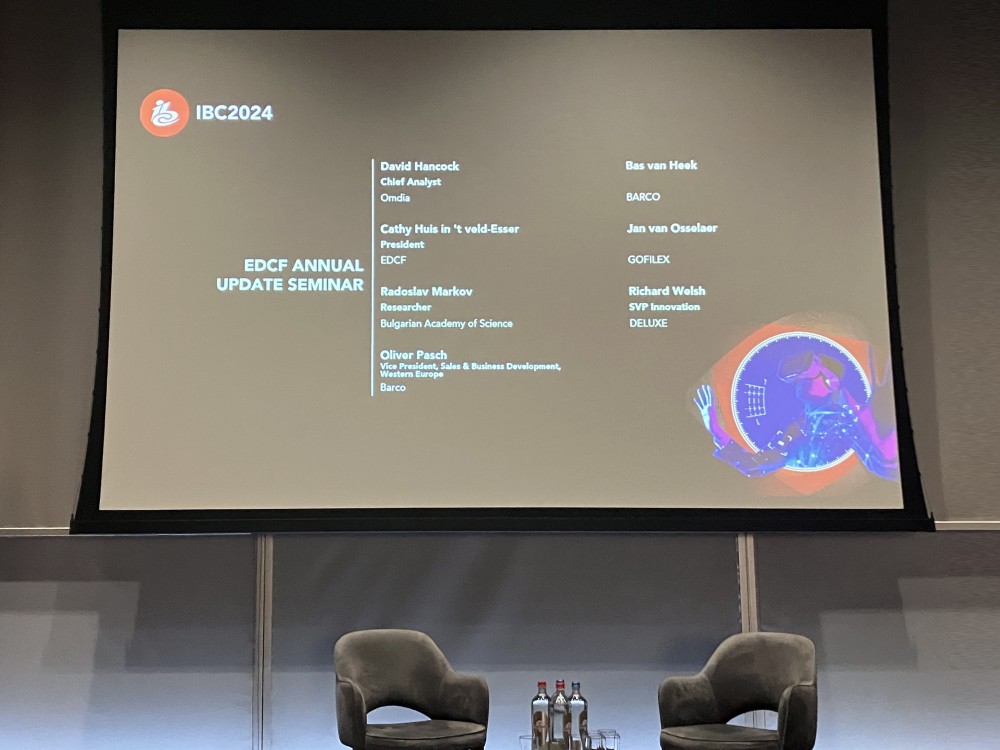On Sunday, 15th September 2024, the European Digital Cinema Forum (EDCF) hosted its annual Global Cinema Seminar at IBC in Amsterdam. Chaired by EDCF President Cathy Huis in ‘t veld-Esser and David Hancock, the seminar addressed the evolving landscape of digital cinema, spotlighting critical issues such as AI, HDR, cinema business challenges, and post-production advancements.
Market overwiew and EDCF activities
The seminar opened with a market update from David Hancock (Omdia). He provided an in-depth analysis of the global cinema market from the pandemic to 2024 and beyond. He noted that while cinemas have not yet fully recovered from the pandemic, with the overall market still trending below 2023 levels, good films continue to capture public attention. Theatrical releases remain an important channel supported by major distributors, but there is a growing challenge in raising public awareness about upcoming releases. David also highlighted the shift in consumer behavior post-pandemic, questioning whether this transformation is here to stay.
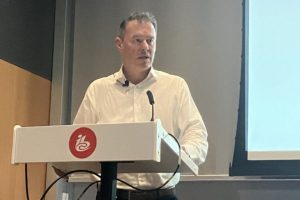
Cathy Huis in ‘t veld-Esser then reviewed several key technical challenges that were identified during the EDCF’s problem-solving round table discussions at CineEurope in Barcelona. One was cinematic judder on Premium Large Format (PLF) screens. This problem arises when there is a lack of smooth motion on large screens, which can significantly affect the audience’s viewing experience, especially during action-packed or fast-moving scenes. Another challenge highlighted was the need to streamline and automate the Key Delivery Message (KDM) process. Cathy also addressed concerns around image artifacts, particularly those related to JPEG2000 encoding and the use of legacy products as well as issues with older servers and certification.
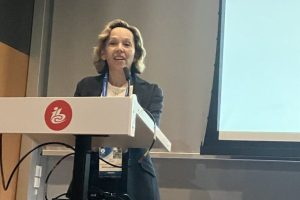
AI in Cinema
Inderjeet Singh presented Imentiv AI’s Emotion AI tool, which analyzes the emotions portrayed by actors in films. This tool helps filmmakers understand how audiences might emotionally connect with their content. By leveraging AI-driven insights, creators can fine-tune performances, anticipate audience reactions, and craft more emotionally resonant narratives. Inderjeet emphasized the value of this tool in improving the overall emotional impact of cinema.
Richard Welsh explored some of the most significant AI solutions and challenges currently impacting (not only) the cinema industry, among them the phenomenon of catastrophic forgetting, a phenomenon where AI systems lose previously learned information when new data is introduced or due to data pollution or over training, which poses challenges for the reliability of AI applications. Richard then shifted focus to the use of digital replicas, highlighting the regulatory challenges associated with creating AI-generated representations of actors or other prominent figures. According to his statement, a mere 24.5% of all deep fakes are recognised by humans making it a huge security threat. He also emphasized the ethical considerations that arise from this technology, particularly in relation to consent and ownership. Richard ended his talk suggesting a training for EDCF members regarding AI and deep fake recognition.
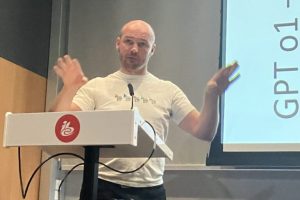
What if a film was always different depending on the time of day, the weather and the environment in which it was viewed? This is a topic that filmmaker, video game producer and researcher Carlos F. de Vigo has been exploring for around 20 years. His disruptive approach to ‘emotional film’, which is created in real time and never offers two identical versions, was a highlight in this seminar’s programme. In a pre-recorded video interview with David Hancock, Carlos gave insights into his world of thought, in which technologies such as AI become a creative tool in the hands of the artist. This is not only about new formats, but also new possibilities for marketing content.
According to Carlos, apart from the disruptive side, AI also has a “traditional side,” where it is used to empower human artistic creation, i.e. when processes and tasks are automated. This can be seen in examples like generating 3D files from storyboards in real time or creating animations. Independent productions, especially those with limited budgets, stand to benefit the most from this, as it significantly reduces both time and costs.
The event also featured a comprehensive update on cinema streaming technologies by Jan van Osselaer (Gofilex). He talked about the rapid advancements and discussed how staying ahead in this dynamic field will be crucial for cinemas, as new innovations offer endless possibilities for growth. Jan emphasized the importance of embracing these technologies to meet evolving audience expectations and to create a seamless cinema experience.
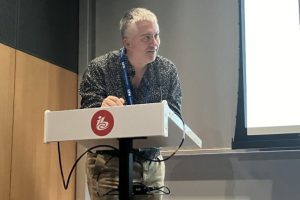
Oliver Pasch from ICTA provided an update on the activities of the International Cinema Technology Association (ICTA), including details on their upcoming seminar series at ShowEast and future events like the LA seminar in January 2025 and at CinemaCon. These events are aimed at advancing the technical aspects of cinema operations globally. He emphasised the importance of cross-industry exchange between all players in organisations such as ICTA or EDCF.

HDR in cinema
Another series of presentations focused on High Dynamic Range (HDR) and its growing adoption in cinema, with insights from multiple experts. This involved laser projection, post-production, and distribution.
Oliver Pasch, now in his Barco role, had first consulted Wikipedia and ChatGPT on the topic for his introductory presentation – with surprising results: the key terms film or cinema did not appear in either case. He then went on to talk about the latest addendum to the DCI specs on HDR and then presented Barco’s lightsteering technology and solutions for post-production and playout in a second presentation.
Senthil Kumar (Qube Cinema) discussed the two main paths to HDR in cinema: direct view screens or projectors using Lightsteering technology. He contrasted the advantages of LED screens in cinemas, such as brightness and contrast ratio, with the disadvantages, such as the challenge of installing sound technology and the lack of DCI certification. Finally, he presented an LED reference monitor and the Epic-Luxon HDR solution.
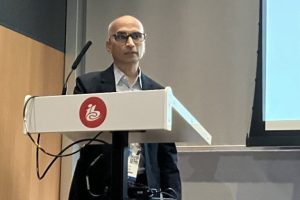
Bas van Heek (Barco) then gave an overview of the situation in the field of projection technology for post-production. In contrast to the cinemas themselves, which are now relying more and more on laser technology, lamp-based projectors are still used for post-production in 99 per cent of cases. However, even if the changeover there is slower, laser technology is becoming increasingly important here too, especially with regard to future HDR content.
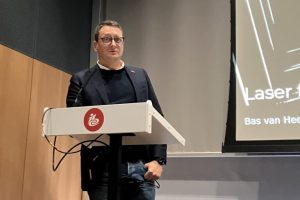
Cedric Lejeune (Unified Pixels) focussed on the complexity of distributing HDR content. He focussed on the many different versions for different platforms and screens. He emphasized the advantages of hybrid tone mapping, which is not only easy to integrate into the grading/mastering/distribution pipeline, but also ensures compatibility with older equipment, saves costs and streamlines the mastering process.
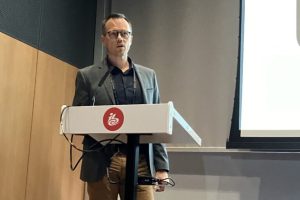
Phil Lord (Christie) presented a different approach to HDR with Variable Dynamic Range (VDR) technology, a software solution that the company had already previewed at Cine Europe. This improves HDR performance by dynamically adjusting brightness and contrast for an optimised viewing experience.
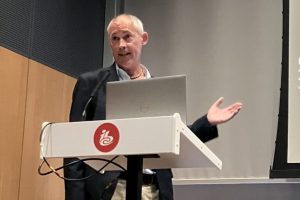
The seminar concluded with insights from the Bulgarian Academy of Science’s Radoslav Markow on adapting local festivals to new cinema technologies. He shared practical advice for adapting local film festivals and cinema events to the latest technological changes. His recommendations included the importance of using green, reliable laser projectors, and ensuring high-quality DCP servers to avoid disruptions. He cautioned against using substandard content creation tools or amateur software and stressed the importance of using professional delivery systems over internet-based options to avoid technical failures during screenings.
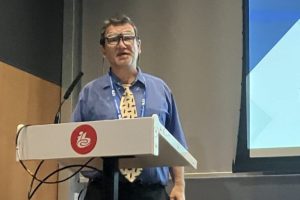
The bottom line
The EDCF Seminar 2024 offered a wide range of current cinema industry topics, from AI-driven creative tools and HDR technology to the challenges posed by legacy systems and changing audience behaviour. The event provided valuable insights and solutions for all industry participants looking to navigate the rapidly evolving landscape of cinema.
